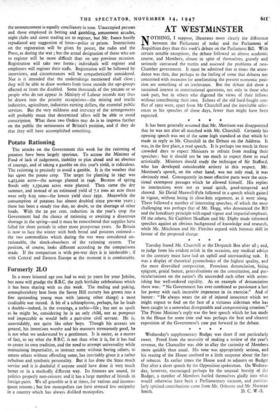AT WESTMINSTER N OTHING, I suppose, illustrates more clearly the difference
between the Parliament of today and the Parliament of Asquithian days than this week's debate on the Parliament Bill. With certain notable exceptions, the debate followed an almost academic course, and Members, almost in spite of themselves, gravely and seriously canvassed the merits and assessed the problems of two- Chamber government. It must be admitted that at times the atten- dance was thin, due perhaps to the feeling of some that debates not concerned with measures for ameliorating the present economic posi- tion are something of an irrelevance. But the debate did show a sustained interest in constitutional questions, not only in those who took part, but in others who digested the views of their fellows without *contributing their own. Echoes of the old hard-fought con- flict of ][910 were, apart from Mr Churchill and the inevitable refer- ences to his speeches of those days, fewer than might have been expected.
* * * * It has been generally assumed that Mr. Morrison was disappointed that he was not after all matched with Mr. Churchill. Certainly his opening speech was not of the same high standard as that which he made in reply to Mr. Churchill in the Debate on the Address. It was, in the first place, a read speech. It is perhaps too much in these crowded days to expect Ministers to refrain from reading their speeches : but it should not be too much to expect them to read artistically. Ministers should study the technique of Sir Stafford, who has developed considerable artistry in this respect. Mr. Morrison's speech, on the other hand, was not only read, it was obviously read. Consequently its most effective parts were the occa- sional extempore passages which he allowed himself. His replies to interjections were not as usual quick, good-tempered and shrewd. Sir David Maxwell-Fyfe followed in a speech which gained in vigour, without losing in close-knit argument, as it went along. There followed a number of interesting speeches, of which the most challenging was perhaps that of Mr. Hogg, who denounced the Bill and the hereditary principle with equal vigour and impartial emphasis. Of the others, Sir Cuthbert Headlam and Mr. Digby made informed speeches against an obvious background of knowledge and research, while Mr. Mitchison and Mr. Fletcher argued with forensic skill in favour of the proposed change.
* * * * Tuesday found Mr. Churchill at the Despatch Box after all ; and, to judge from his evident relish in the occasion, any medical advice to the contrary must have had an uphill and unrewarding task. It was a display of rhetorical pyrotechnics of the highest quality, and the most diversified composition. Ferocious denunciation, biting epigram, genial banter, generalisations on the constitution, and par- ticularisations on the nation's ills succeeded each other with aston- ishing but well-ordered rapidity. As an example of denunciation there was: "No Government has ever combined so passionate a lust for power with such incurable impotence in its exercise." And of banter : " He always wears the air of injured innocence which we might expect to find on the face of a virtuous alderman who has been caught in a somewhat disreputable and compromising situation." The Prime Minister's reply was the best speech which he has made in the House for some time and was perhaps the best and clearest exposition of the Government's case put forward in the debate.
* * * * Wednesday's supplementary Budget was short if not particularly sweet. Freed from the necessity of making a review of the year's revenue, the Chancellor was able to allay the curiosity of Members more quickly than usual. His tone was appropriately serious, and his teasing of the House confined to a little suspense about the fate of tobacco. In earlier times the House used to adjourn on Budget Day after a short speech by the Opposition spokesman. On Wednes- day, however, encouraged perhaps by the unusual brevity of the Budget, a number of Members hurled themselves gladly into what would otherwise have been a Parliamentary vacuum, and particu- larly spirited contributions came from Mr. Osborne and Mr. Norman






























 Previous page
Previous page